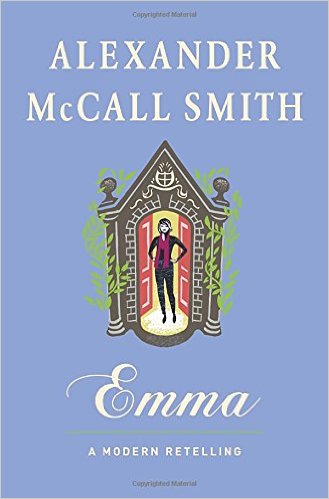Emma, by Alexander McCall Smith
Jan 19
2016

Emma Woodhouse is not my favorite Jane Austen heroine, but she deserves better treatment than she receives in Alexander McCall Smith's Emma, one of the six titles in The Austen Project, an attempt to re-imagine Austen's novels with a modern setting. Austen's Emma is a flawed but endearing character who eventually begins to correct her many faults; Smith's Emma, in contrast, is a waste of space who eventually becomes... slightly less of a waste of space. Slightly.
In Smith's version of the novel, Emma is a recent university graduate who has just returned home to mooch off her wealthy, hypochondriac father. She strikes up a friendship with Harriet Smith, a sweet but dim-witted teaching assistant, and immediately starts to meddle in Harriet's personal life. Emma's brother-in-law George Knightley wants her to mind her own business, but Emma is convinced that the residents of her small corner of England will be better off with her arranging things.
To do him justice, I suspect Smith was directed to stick as closely as possible to the events of the original book, even when he would have been far better off replacing them with something more appropriate for the current era. And it's not like this can't be done! Hell, it's already been done: the 1995 film Clueless does an incredible job of updating Emma: swapping a small country village with an equally class-conscious American high school, equating the highest-ranked woman in town with a teenage Queen Bee, replacing a close family friend with a former step-sibling. These changes don't detract from the themes of Austen's story—instead, they allow viewers to appreciate their timelessness. Smith, on the other hand, clings to the exact patterns of Austen's 1815 novel like grim death, even when they require distracting and far-fetched justification to work in a modern setting.
And speaking of far-fetched and distracting justifications, how did Smith's editors let him get away with the staggering amount of pointless crap he stuffs into this book? He devotes pages of material to characters like Ronnie, the solar-panel installer who George Knightley's university love interest eventually ends up dating. WHO CARES? I'm assuming Smith uses these creative digressions as a way to assert his own influence over the material, but the end result means that he's still droning on about the marriage of Miss Taylor and Mr. Weston 125 pages in, while Jane Austen has dispensed with the issue by the end of chapter two. In contrast, the things we we actually give a damn about (Emma and George Knightley's relationship, for example) are given short shrift. The end result is an awkward, poorly constructed novel that works about as well as an Austen themed porn—the details may be similar, but the heart and brains of the story are missing.
In Smith's version of the novel, Emma is a recent university graduate who has just returned home to mooch off her wealthy, hypochondriac father. She strikes up a friendship with Harriet Smith, a sweet but dim-witted teaching assistant, and immediately starts to meddle in Harriet's personal life. Emma's brother-in-law George Knightley wants her to mind her own business, but Emma is convinced that the residents of her small corner of England will be better off with her arranging things.
To do him justice, I suspect Smith was directed to stick as closely as possible to the events of the original book, even when he would have been far better off replacing them with something more appropriate for the current era. And it's not like this can't be done! Hell, it's already been done: the 1995 film Clueless does an incredible job of updating Emma: swapping a small country village with an equally class-conscious American high school, equating the highest-ranked woman in town with a teenage Queen Bee, replacing a close family friend with a former step-sibling. These changes don't detract from the themes of Austen's story—instead, they allow viewers to appreciate their timelessness. Smith, on the other hand, clings to the exact patterns of Austen's 1815 novel like grim death, even when they require distracting and far-fetched justification to work in a modern setting.
And speaking of far-fetched and distracting justifications, how did Smith's editors let him get away with the staggering amount of pointless crap he stuffs into this book? He devotes pages of material to characters like Ronnie, the solar-panel installer who George Knightley's university love interest eventually ends up dating. WHO CARES? I'm assuming Smith uses these creative digressions as a way to assert his own influence over the material, but the end result means that he's still droning on about the marriage of Miss Taylor and Mr. Weston 125 pages in, while Jane Austen has dispensed with the issue by the end of chapter two. In contrast, the things we we actually give a damn about (Emma and George Knightley's relationship, for example) are given short shrift. The end result is an awkward, poorly constructed novel that works about as well as an Austen themed porn—the details may be similar, but the heart and brains of the story are missing.
Posted by: Julianka
No new comments are allowed on this post.
Comments
No comments yet. Be the first!